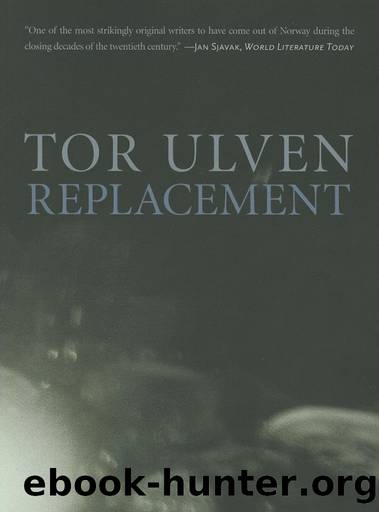Replacement by Tor Ulven

Author:Tor Ulven [Ulven, Tor]
Language: eng
Format: azw3
Tags: Literary, Fiction
ISBN: 9781564787477
Publisher: Dalkey Archive Press
Published: 2012-04-23T23:00:00+00:00
AFTERWORD
Few authors in postwar Norway have had a stronger and more direct influence on their contemporaries and successors. Itâs an influence that has helped major talents find their voices and reduced lesser talents to mere epigoni. And itâs an influence that is, so to speak, inversely proportional to the bibliography. Five poetry collections and five prose works, thatâs all Tor Ulven (b. 1953) published from the time he debuted in 1977 to the day he took his own life in 1995. Around a thousand and a half pages, including posthumous publications: a compact and concentrated whole, divvied out piecemeal, for the most part in small portions, like the lifework of a Cioran or a Vermeer.
His debut work, a poetry collection entitled Skyggen av urfuglen (The Shadow of the Primordial Bird), exhibits clear traits of surrealism. This was already a well-established interest (Ulven showed his own drawings at the World Surrealist Exhibition in Chicago in 1976!) that would last his entire life (his translation of René Charâs poems appeared in 1985), though in this first book it was still unripe: a promising bud rather than a full autumn crop. Indeed, when Ulven was in charge of putting together a collection of his selected poetry in 1993, he took only a few poems from this first work. The true poet emerged in the two following collections, Etter oss, tegn (After Us, Signs, 1980) and Forsvinningspunkt (Vanishing Point, 1981).
A six-year-long span of retreat and isolation was finally broken by what shoulg be considered one of Ulvenâs major works, Det tÃ¥lmodige (Patience), in 1987. Artifacts, ruins, fossils, junk, archeological finds, human remains (in every sense): itâs all there, all bundled together; durability contrasts with decay to form an overarching perspective, which is captured in the multifaceted title; patience emerging as the (one) thing that endures, an eternal constant, the observing human consciousness that, unaffected by timeâs passage, remains unshaken as it describes the continuity of things, those insentient substances with no alternative but perpetual being, continuous existence. Regarded in this way, we could say that Det tÃ¥lmodige brings Ulvenâs poetic project to a head, thereby releasing the prose-writer in him.
Gravgaver (Burial Gifts) was published the following year, with the subtitle, or genre heading, if you will, of Fragmentarium (Fragments), a novel in pieces, which expands on the theme of decay from Det tÃ¥lmodige in beautiful, musical prose sequences. These two works are separated by a single year, as if theyâre standing there, back to back, two masterworks mutually supporting one another, Ulvenâs last pure poetry collection and his first pure work of prose. Taken together, they form a melancholy magnum opus, whose thesis, in short, is that everything is already past, that everything weâre capable of understanding and reflecting upon has already happened, has already been. And at the same time: the past is present, the past is now. We live on the trash heap of history, occupied with ordering and organizing an overwhelming collection of memories, both our own and those of others.
Download
This site does not store any files on its server. We only index and link to content provided by other sites. Please contact the content providers to delete copyright contents if any and email us, we'll remove relevant links or contents immediately.
Twisted Games: A Forbidden Royal Bodyguard Romance by Ana Huang(4029)
Den of Vipers by K.A Knight(2701)
The Push by Ashley Audrain(2698)
Win by Harlan Coben(2665)
Echo by Seven Rue(2246)
Baby Bird by Seven Rue(2214)
Beautiful World, Where Are You: A Novel by Sally Rooney(2181)
A Little Life: A Novel by Hanya Yanagihara(2151)
Iron Widow by Xiran Jay Zhao(2126)
Leave the World Behind by Rumaan Alam(2099)
Midnight Mass by Sierra Simone(2014)
Bridgertons 2.5: The Viscount Who Loved Me [Epilogue] by Julia Quinn(1794)
Undercover Threat by Sharon Dunn(1791)
The Four Winds by Hannah Kristin(1773)
Sister Fidelma 07 - The Monk Who Vanished by Peter Tremayne(1669)
The Warrior's Princess Prize by Carol Townend(1631)
Snowflakes by Ruth Ware(1600)
Dark Deception by Rina Kent(1570)
Facing the Mountain by Daniel James Brown(1553)
